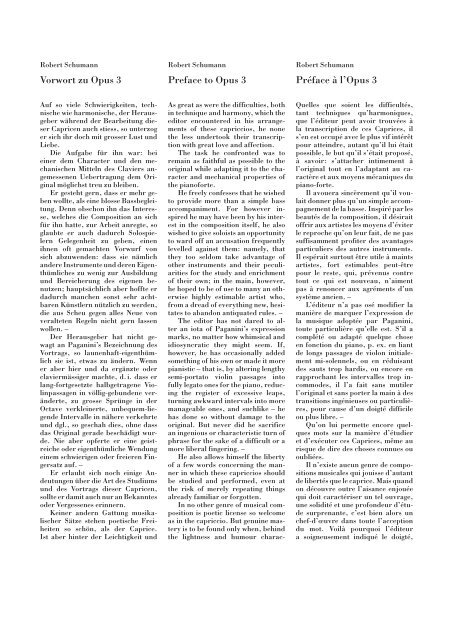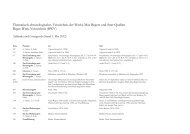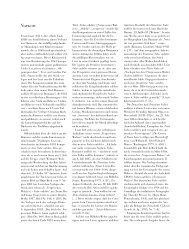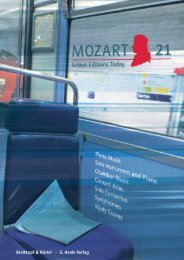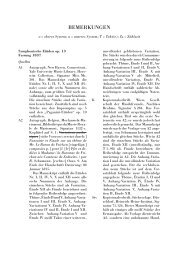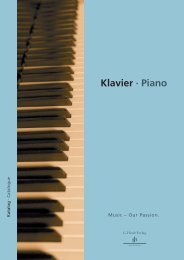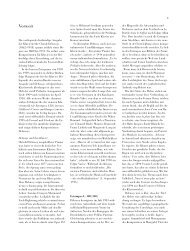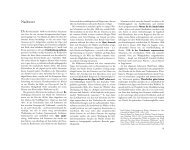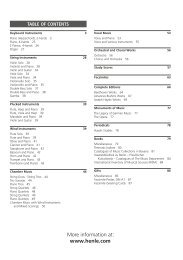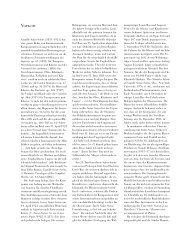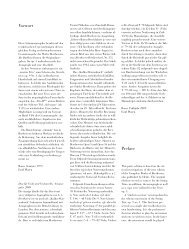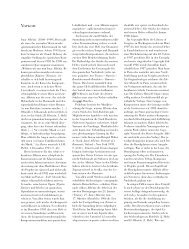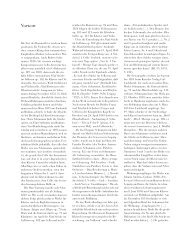Vorwort (PDF, 1698 KB) - Henle Verlag
Vorwort (PDF, 1698 KB) - Henle Verlag
Vorwort (PDF, 1698 KB) - Henle Verlag
You also want an ePaper? Increase the reach of your titles
YUMPU automatically turns print PDFs into web optimized ePapers that Google loves.
XLIII<br />
Robert Schumann<br />
<strong>Vorwort</strong> zu Opus 3<br />
Robert Schumann<br />
Preface to Opus 3<br />
Robert Schumann<br />
Préface à l’Opus 3<br />
Auf so viele Schwierigkeiten, technische<br />
wie harmonische, der Herausgeber<br />
während der Bearbeitung dieser<br />
Capricen auch stiess, so unterzog<br />
er sich ihr doch mit grosser Lust und<br />
Liebe.<br />
Die Aufgabe für ihn war: bei<br />
einer dem Character und den mechanischen<br />
Mitteln des Claviers angemessenen<br />
Uebertragung dem Original<br />
möglichst treu zu bleiben.<br />
Er gesteht gern, dass er mehr geben<br />
wollte, als eine blosse Bassbegleitung.<br />
Denn obschon ihn das Interesse,<br />
welches die Composition an sich<br />
für ihn hatte, zur Arbeit anregte, so<br />
glaubte er auch dadurch Solospielern<br />
Gelegenheit zu geben, einen<br />
ihnen oft gemachten Vorwurf von<br />
sich abzuwenden: dass sie nämlich<br />
andere Instrumente und deren Eigenthümliches<br />
zu wenig zur Ausbildung<br />
und Bereicherung des eigenen benutzen;<br />
hauptsächlich aber hoffte er<br />
dadurch manchen sonst sehr achtbaren<br />
Künstlern nützlich zu werden,<br />
die aus Scheu gegen alles Neue von<br />
veralteten Regeln nicht gern lassen<br />
wollen. –<br />
Der Herausgeber hat nicht gewagt<br />
an Paganini’s Bezeichnung des<br />
Vortrags, so launenhaft-eigenthümlich<br />
sie ist, etwas zu ändern. Wenn<br />
er aber hier und da ergänzte oder<br />
claviermässiger machte, d. i. dass er<br />
lang-fortgesetzte halbgetragene Violinpassagen<br />
in völlig-gebundene veränderte,<br />
zu grosse Sprünge in der<br />
Octave verkleinerte, unbequem-liegende<br />
Intervalle in nähere verkehrte<br />
und dgl., so geschah dies, ohne dass<br />
das Original gerade beschädigt wurde.<br />
Nie aber opferte er eine geistreiche<br />
oder eigenthümliche Wendung<br />
einem schwierigen oder freieren Fingersatz<br />
auf. –<br />
Er erlaubt sich noch einige Andeutungen<br />
über die Art des Studiums<br />
und des Vortrags dieser Capricen,<br />
sollte er damit auch nur an Bekanntes<br />
oder Vergessenes erinnern.<br />
Keiner andern Gattung musikalischer<br />
Sätze stehen poetische Freiheiten<br />
so schön, als der Caprice.<br />
Ist aber hinter der Leichtigkeit und<br />
As great as were the difficulties, both<br />
in technique and harmony, which the<br />
editor encountered in his arrangements<br />
of these capriccios, he none<br />
the less undertook their transcription<br />
with great love and affection.<br />
The task he confronted was to<br />
remain as faithful as possible to the<br />
original while adapting it to the character<br />
and mechanical properties of<br />
the pianoforte.<br />
He freely confesses that he wished<br />
to provide more than a simple bass<br />
accompaniment. For however inspired<br />
he may have been by his interest<br />
in the composition itself, he also<br />
wished to give soloists an opportunity<br />
to ward off an accusation frequently<br />
levelled against them: namely, that<br />
they too seldom take advantage of<br />
other instruments and their peculiarities<br />
for the study and enrichment<br />
of their own; in the main, however,<br />
he hoped to be of use to many an otherwise<br />
highly estimable artist who,<br />
from a dread of everything new, hesitates<br />
to abandon antiquated rules. –<br />
The editor has not dared to alter<br />
an iota of Paganini’s expression<br />
marks, no matter how whimsical and<br />
idiosyncratic they might seem. If,<br />
however, he has occasionally added<br />
something of his own or made it more<br />
pianistic – that is, by altering lengthy<br />
semi-portato violin passages into<br />
fully legato ones for the piano, reducing<br />
the register of excessive leaps,<br />
turning awkward intervals into more<br />
manageable ones, and suchlike – he<br />
has done so without damage to the<br />
original. But never did he sacrifice<br />
an ingenious or characteristic turn of<br />
phrase for the sake of a difficult or a<br />
more liberal fingering. –<br />
He also allows himself the liberty<br />
of a few words concerning the manner<br />
in which these capriccios should<br />
be studied and performed, even at<br />
the risk of merely repeating things<br />
already familiar or forgotten.<br />
In no other genre of musical composition<br />
is poetic license so welcome<br />
as in the capriccio. But genuine mastery<br />
is to be found only when, behind<br />
the lightness and humour charac-<br />
Quelles que soient les difficultés,<br />
tant techniques qu’harmoniques,<br />
que l’éditeur peut avoir trouvées à<br />
la transcription de ces Caprices, il<br />
s’en est occupé avec le plus vif intérêt<br />
pour atteindre, autant qu’il lui était<br />
possible, le but qu’il s’était proposé,<br />
à savoir: s’attacher intimement à<br />
l’original tout en l’adaptant au caractère<br />
et aux moyens mécaniques du<br />
piano-forte.<br />
Il avouera sincèrement qu’il voulait<br />
donner plus qu’un simple accompagnement<br />
de la basse. Inspiré par les<br />
beautés de la composition, il désirait<br />
offrir aux artistes les moyens d’éviter<br />
le reproche qu’on leur fait, de ne pas<br />
suffisamment profiter des avantages<br />
particuliers des autres instruments.<br />
Il espérait surtout être utile à maints<br />
artistes, fort estimables peut-être<br />
pour le reste, qui, prévenus contre<br />
tout ce qui est nouveau, n’aiment<br />
pas à renoncer aux agréments d’un<br />
système ancien. –<br />
L’éditeur n’a pas osé modifier la<br />
manière de marquer l’expression de<br />
la musique adoptée par Paganini,<br />
toute particulière qu’elle est. S’il a<br />
complété ou adapté quelque chose<br />
en fonction du piano, p. ex. en liant<br />
de longs passages de violon initialement<br />
mi-solennels, ou en réduisant<br />
des sauts trop hardis, ou encore en<br />
rapprochant les intervalles trop incommodes,<br />
il l’a fait sans mutiler<br />
l’original et sans porter la main à des<br />
transitions ingénieuses ou particulières,<br />
pour cause d’un doigté difficile<br />
ou plus libre. –<br />
Qu’on lui permette encore quelques<br />
mots sur la manière d’étudier<br />
et d’exécuter ces Caprices, même au<br />
risque de dire des choses connues ou<br />
oubliées.<br />
Il n’existe aucun genre de compositions<br />
musicales qui jouisse d’autant<br />
de libertés que le caprice. Mais quand<br />
on découvre outre l’aisance enjouée<br />
qui doit caractériser un tel ouvrage,<br />
une solidité et une profondeur d’étude<br />
surprenante, c’est bien alors un<br />
chef-d’œuvre dans toute l’acception<br />
du mot. Voilà pourquoi l’éditeur<br />
a soigneusement indiqué le doigté,


